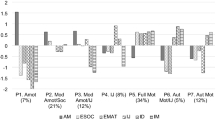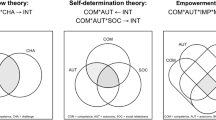Abstract
Control theory has been propounded as an original and useful paradigm for integrating a number of theories of human (especially work) motivation. This paper challenges that claim. First, it is shown that the original, mechanical control theory model is not applicable to human beings. Second, it is shown that the two approaches used by control theorists to remedy its limitations did not succeed. One approach involved incorporating propositions drawn from other theories with the result that there was nothing distinctive left that was unique to control theory. The other approach involved broadening the scope of control theory by adding deduced propositions; however, these propositions were inconsistent with what was already known about the phenomena in question based on empirical research. The control theory approach to theory building is contrasted with that of goal setting theory (Locke & Latham, 1990). Goal-setting theory is a “grounded theory” (Glaser & Strauss, 1967) which evolved from research findings over a 25-year period. Goal theory developed in five directions simultaneously: validation of the core premises; demonstrations of generality; identification of moderators; conceptual refinement and elaboration; and integration with other theories. It is hypothesized that the grounded theory approach is a more fruitful one than the approaches used by control theory.
Similar content being viewed by others
References
Bandura, A. (1986).Social foundations of thought and action: A social-cognitive view. Englewood Cliffs, NJ: Prentice-Hall.
Bandura, A. (1990). Reflections on nonability determinants competence. In R. Sternberg & J. Kolligan (Eds.),Competence considered. New Haven: Yale University Press.
Bandura, A., & Cervone, D. (1986). Differential engagement of self-reactive influences in cognitive motivation.Organizational Behavior and Human Decision Processes, 38 92–113.
Baron, R. A., & Byrne, D. (1991).Social psychology (6th ed). Boston: Allyn & Bacon.
Binswanger, H. (1990).The biological basis of teleological concepts. Los Angeles: Ayn Rand Institute Press.
Campion, M. A., & Lord, R. G. (1982). A control systems conceptualization of the goal-setting and changing process.Organizational Behavior and Human Performance, 30 265–287.
Carver, C. S., & Scheier, M. F. (1981).Attention and self-regulation: A control theory approach to human behavior. New York: Springer-Verlag.
Carver, C. S., & Scheier, M. F. (1982). Control theory: A useful conceptual framework for personality-social, clinical, and health psychology.Psychological Bulletin, 92 111–135.
Carver, C. S., & Scheier, M. F. (1990). Origins and functions of positive and negative affect: A control-process view.Psychological Review, 97 19–35.
Cofer, C. N., & Appley, M. H. (1967).Motivation: Theory and research. New York: Wiley.
Earley, C. P., Connolly, T., & Ekegren, G. (1989). Goals, strategy development and task performance: Some limits on the efficacy of goal setting.Journal of Applied Psychology, 74 24–33.
Earley, P. C., & Kanfer, R. (1985). The influence of component participation and role models on goal acceptance, goal satisfaction and performance.Organizational Behavior and Human Decision Processes, 36 378–390.
Erez, M. (1977). Feedback: A necessary condition for the goal setting-performance relationship.Journal of Applied Psychology, 62 624–627.
Garland, H. (1984). Relation of effort-performance expectancy to performance in goal-setting experiments.Journal of Applied Psychology, 69 79–84.
Glaser, B. G., & Strauss, A. L. (1967).The discovery of grounded theory. Chicago: Aldine.
Hollenbeck, J. R. (1989). Control theory and the perception of work environments: The effects of focus of attention on affective and behavioral reactions to work.Organizational Behavior and Human Decision Processes, 43 406–430.
Hollenbeck, J. R., & Klein, H. J. (1987). Goal commitment and the goal setting process: Problems, prospects and proposals for future research.Journal of Applied Psychology, 72 212–220.
Hollenbeck, J. R., & Williams, C. R. (1987). Goal importance, self-focus, and the goal-setting process.Journal of Applied Psychology, 72 204–211.
Hyland, M. E. (1988). Motivational control theory: An integrative framework.Journal of Personality and Social Psychology, 55 642–651.
Klein, H. J. (1989). An integrated control theory model of work motivation.Academy of Management Review, 14 150–172.
Latham, G. P., Erez, M., & Locke, E. A. (1988). Resolving scientific disputes by the joint design of crucial experiments by the antagonists: Application to the Erez-Latham dispute regarding participation in goal setting.Journal of Applied Psychology (Monograph),73 753–772.
Locke, E. A. (1966). The relationship of intentions to level of performance.Journal of Applied Psychology, 50 60–66.
Locke, E. A. (1967a). Motivational effects of knowledge of results: Knowledge or goal setting?Journal of Applied Psychology, 51 324–329.
Locke, E. A. (1967b). Relationship of goal level to performance level.Psychological Reports, 20 1968.
Locke, E. A. (1968). Toward a theory of task motivation and incentives.Organizational Behavior and Human Performance, 3 157–189.
Locke, E. A. (1969). Purpose without consciousness: A contradiction.Psychological Reports, 25 991–1009.
Locke, E. A. (1976). The nature and causes of job satisfaction. In M. D. Dunnette (Ed.),Handbook of industrial and organizational psychology. Chicago: Rand-McNally.
Locke, E. A. (1984). Job satisfaction. In M. Gruneberg & T. Wall (Eds.),Social psychology and organizational behavior. Chichester, England: Wiley Ltd.
Locke, E. A., & Bryan, J. F. (1966a). Cognitive aspects of psychomotor performance: The effects of performance goals on level of performance.Journal of Applied Psychology, 50 286–291.
Locke, E. A., & Bryan, J. F. (1966b). The effects of goal-setting, rule-learning, and knowledge of score on performance.American Journal of Psychology, 79 451–457.
Locke, E. A., & Bryan, J. F. (1967). Performance goals as determinants of level of performance and boredom.Journal of Applied Psychology, 51 120–130.
Locke, E. A., Cartledge, N., & Knerr, C. (1970). Studies of relationship between satisfaction, goal-setting and performance.Organizational Behavior and Human Performance, 5 135–158.
Locke, E. A., Cartledge, N., & Koeppel, J. (1968). Motivational effects of knowledge of results: A goal-setting phenomenon?Psychological Bulletin, 70 474–485.
Locke, E. A., Chah, D.-OK, Harrison, S., & Lustgarten, N. (1989). Separating the effects of goal specificity from goal level.Organizational Behavior and Human Decision Processes, 43 270–287.
Locke, E. A., & Latham, G. P. (1990).A theory of goal setting and task performance. Englewood Cliffs, NJ: Prentice-Hall.
Locke, E. A., Motowidlo, S. J., & Bobko, P. (1986). Using self-efficacy theory to resolve the conflict between goal-setting theory and expectancy theory in organizational behavior and industrial/organizational psychology.Journal of Social and Clinical Psychology, 4 328–338.
Locke, E. A., Shaw, K. M., Saari, L. M., & Latham, G. P. (1981). Goal setting and task performance: 1969–1980.Psychological Bulletin, 90 125–52.
Lord, R. G., & Hanges, P. J. (1987). A control system model of organizational motivation: Theoretical development and applied implications.Behavioral Science, 32 161–178.
Matsui, T. Okada, A., & Mizuguchi, R. (1981). Expectancy theory prediction of the goal theory postulate, “the harder the goals, the higher the performance.”Journal of Applied Psychology, 66 54–58.
Mento, A. J., Cartledge, N. D., & Locke, E. A. (1980). Maryland vs. Michigan vs. Minnesota: Another look at the relationship of expectancy and goal difficulty to task performance.Organizational Behavior and Human Performance, 25 419–440.
Mento, A. J., Locke, E. A., & Klein, H. J. (1990).Studies of the relationship between goals, valences and instrumentalities. Unpublished manuscript, Loyola College, Baltimore.
Miller, G. A., Galanter, E., & Pribram, I. H. (1960).Plans and the structure of behavior. New York: Henry Holt.
Miner, J. B. (1984). The validity and usefulness of theories in an emerging organizational science.Academy of Management Review, 9 296–306.
Mobley, W. H., & Locke, E. A. (1970). The relationship of value importance to satisfaction.Organizational Behavior and Human Performance, 5 463–483.
Nuttin, J. (1984).Motivation, planning and action. Hillsdale, NJ: Erlbaum.
Powers, W. T. (1973). Feedback: Beyond behaviorism.Science, 179 351–356.
Rakestraw, T. L., Jr., & Weiss, H. M. (1981). The interaction of social influences and task experience on goals, performance, and performance satisfaction.Organizational Behavior and Human Performance, 27 326–344.
Ryan, T. A. (1970).Intentional behavior. New York: Ronald.
Shank, R., & Abelson, R. (1977).Scripts, plans, goats and understanding. New York: Halsted.
Vroom, V. (1964).Work and motivation. New York: Wiley.
Weiner, B. (1986).An attribution theory of motivation, New York: Springer-Verlag.
Wiener, N. (1948).Cybernetics: Control and communication in the animal and the machine. Cambridge, MA: MIT Press.
White, R. W. (1959). Motivation reconsidered: The concept of competence.Psychological Review, 66 297–333.
Wood, R. E., & Locke, E. A. (1990). Goal setting and strategy effects on complex tasks. In B. Staw & L. Cummings (Eds.),Research in organizational behavior (Vol. 12), Greenwich, CT: JAI Press.
Wood, R. E., & Mento, A. J., & Locke, E. A. (1987). Task complexity as a moderator of goal effects: A meta-analysis.Journal of Applied Psychology, 72 416–425.
Author information
Authors and Affiliations
Additional information
The author wishes to thank Judy Olian for her helpful comments on this paper and Dong-OK Chah for making the figures.
Rights and permissions
About this article
Cite this article
Locke, E.A. Goal theory vs. control theory: Contrasting approaches to understanding work motivation. Motiv Emot 15, 9–28 (1991). https://doi.org/10.1007/BF00991473
Issue Date:
DOI: https://doi.org/10.1007/BF00991473




